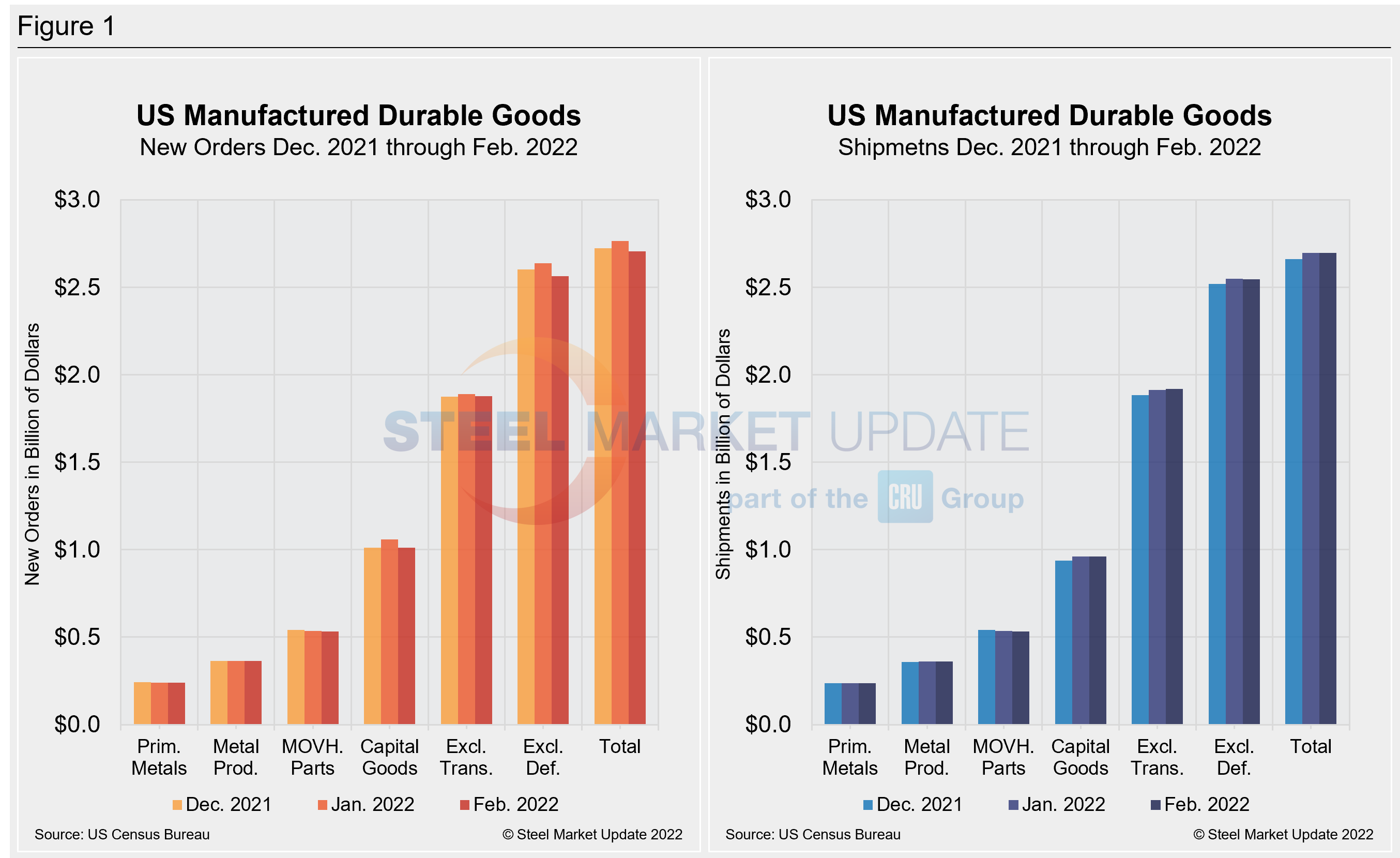Market Data

March 29, 2022
February Durable Goods Sink for First Time in Five Months
Written by David Schollaert
New orders for US manufactured durable goods fell 2.2%, or $6.0 billion, in February, snapping a four-month rally, according to the Commerce Department.
Orders at domestic factories for long-lasting goods fell more than expected last month, while business investment fell for the first time in a year. February’s outcome suggests high inflation and ongoing supply shortages are restraining an otherwise strong economic recovery.
![]() The setback in durable goods orders was driven by commercial planes and autos, volatile measures that tend to swing sharply month to month. A more precise measure of demand that excludes transportation and military hardware, known as core orders, fell 0.3% in February.
The setback in durable goods orders was driven by commercial planes and autos, volatile measures that tend to swing sharply month to month. A more precise measure of demand that excludes transportation and military hardware, known as core orders, fell 0.3% in February.
Among the categories in the report, decliners outnumbered gainers five to two, while the catch-all “other durables” category rose 0.8%, and electrical equipment and appliances added 0.2%.
On the downside, transportation equipment sank 5.6%. Within the transportation equipment category, motor vehicles and parts decreased 0.5% as auto manufacturers continue to struggle with chip shortages. Non-defense aircraft lost 30.4%. Defense aircraft, however, jumped 60.1%.
Machinery orders decreased by 2.6%, computers and electronic products fell 1.1%, primary metals were off 0.9%, and fabricated metal products dipped by 0.1%. Still, compared to a year ago, every major category showed gains.
Below is the February advance report from the U.S. Census Bureau on durable goods manufacturers’ shipments, inventories, and orders:
New Orders
New orders for manufactured durable goods in February decreased $6.0 billion, or 2.2% to $271.5 billion, the U.S. Census Bureau announced today. This decrease, down following four consecutive monthly increases, followed a 1.6% January increase. Excluding transportation, new orders decreased 0.6%. Excluding defense, new orders decreased 2.7%. Transportation equipment, down following three consecutive monthly increases, led the decrease, $4.9 billion or 5.6% to $82.6 billion.
Shipments
Shipments of manufactured durable goods in February decreased $0.1 billion, or virtually unchanged at $270.6 billion. This followed a 1.3% January increase. Machinery, down following three consecutive monthly increases, drove the decrease.
Unfilled Orders
Unfilled orders for manufactured durable goods in February increased $5.3 billion, or 0.4%, to $1,288.4 billion. This followed a 0.9% January increase and marked 13 consecutive months of gains. Transportation equipment, up twelve of the last thirteen months, led the increase, up $4.9 billion, or 0.6%, to $853.4 billion.
Inventories
Inventories of manufactured durable goods in February were also up for thirteen consecutive months. They increased $2.0 billion, or 0.4%, to $478.5 billion. This followed a 0.5% January increase. Machinery, up for sixteen consecutive months, led the increase, up $0.8 billion, or 1.0% ,to $80.5 billion.
Capital Goods
Non-defense new orders for capital goods in February decreased $6.5 billion, or 6.7%, to $89.9 billion. Shipments increased $0.2 billion, or 0.2%, to $84.4 billion. Unfilled orders increased $5.5 billion, or 0.7%, to $798.6 billion. Inventories increased $1.4 billion, or 0.7%, to $209.9 billion.
Defense new orders for capital goods in February increased $1.5 billion, or 14.2%, to $12.2 billion. Shipments decreased $0.1 billion, or 0.8%, to $12.9 billion. Unfilled orders decreased $0.7 billion, or 0.4%, to $184.9 billion. Inventories decreased $0.1 billion, or 0.6%, to $21.3 billion.

Revised and Recently Benchmarked January Data
Revised seasonally adjusted January figures for all manufacturing industries were as follows: new orders, $544.7 billion (revised from $544.2 billion); shipments, $537.8 billion (revised from $536.9 billion); unfilled orders, $1,283.1 billion (revised from $1,283.5 billion) and total inventories, $779.8 billion (revised from $779.6 billion).
By David Schollaert, David@SteelMarketUpdate.com







